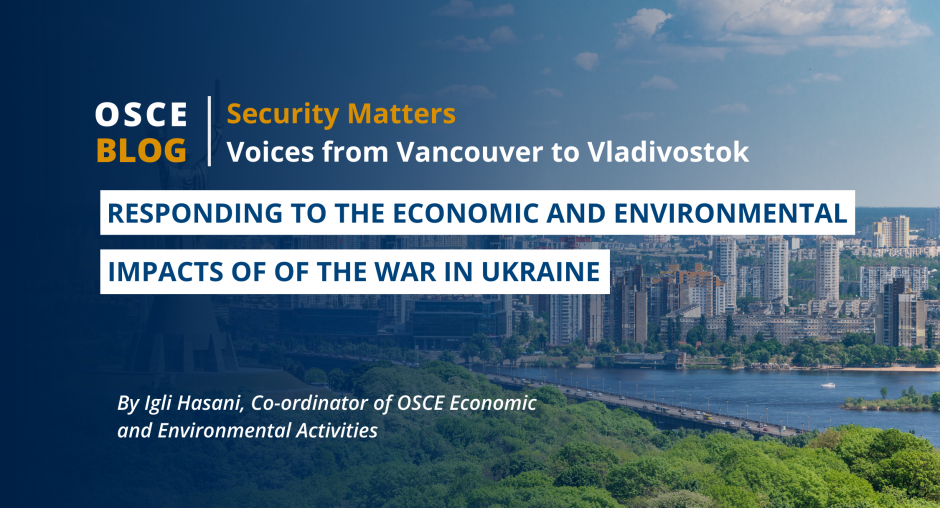Responding to the economic and environmental impacts of the war in Ukraine

The war in Ukraine has triggered a paradigm shift in the European security landscape and the room for political dialogue and co-operation is shrinking. This has a detrimental effect on our common economic and environmental security. We need to think differently and the OSCE is well-placed to ensure long-term co-operation and a sustainable perspective on this work.
First, inflation and soaring commodity prices. A recent report issued by the World Bank estimates that the ongoing armed conflict will lead to a dramatic increase in prices of goods necessary for everyday life for people around the world: be it agricultural products such as grain to feed their families, energy to heat their homes or basic materials to keep our industries running. This is a matter of serious concern, with severe repercussions on food security, and large disastrous economic and humanitarian effects on the poorest households. With poor families typically spending a larger share of their income on food and energy, they are particularly vulnerable to the current, and future, price spikes.
Second, the environmental impact. While Ukraine bears the brunt of the armed conflict - also in terms of land degradation, soil contamination, the release of polluting substances into the environment or damage to civilian infrastructure - no one should underestimate the regional environmental impacts of the ongoing war. Ukraine’s immediate neighbours are equally exposed to air and water pollution as well as hazardous waste contamination. One example is forest fires near nuclear reactors, which in the past, have led to increased radiation levels and, as we know, radioactive pollution does not stop at the border.
At the Office of the Co-ordinator of OSCE Economic and Environmental Activities (OCEEA) we carefully monitor and review available sources to collect information on environmental threats, hazards and impacts resulting from the armed conflict in Ukraine. We can build upon a large network of local interlocutors and the wealth of expertise gathered over the past years. These provide a strong basis to respond to and mitigate these risks in a post-conflict scenario.
Thanks to our experience and long-standing partnership with other international organizations, we are well-positioned to develop a set of activities related to Ukraine, should the circumstances on the ground allow it.
Some examples of work that falls within our mandate and that we stand ready to implement include:
- Assessing how the armed conflict has impacted the environment in the territory affected by the Chernobyl accident and other areas at high risk of natural and man-made disasters (e.g. wildfire, flooding, drought)
- Development of sustainable resilient and climate-adapted reconstruction plans
- Supporting water resource management, including in transboundary contexts, taking into account the impact of the armed conflict
- Working with Ukrainian authorities in countering corruption at the local level, including policy solutions to help Ukrainian agencies counter corruption at the local level
- Working with public and private sector stakeholders to facilitate trade and exports of Ukrainian grain, thus also contributing to improving global food security
- Support the needs of the Ukrainian energy sector to guarantee energy security and the transformation towards a sustainable energy future
Thanks to its unique advantages, the OSCE can take a leadership role in international assistance in this field. We can convene major international stakeholders, including specialized United Nations agencies, to develop joint programmes and joint fundraising.
Finally, to make sure that we have the full picture and do not waste resources duplicating our efforts, we are discussing and co-ordinating all our work as part of a “whole of the OSCE” approach. This brings together my Office, thematic departments, field operations, such as the Project Co-ordinator in Ukraine, and other executive structures to achieve the best response for all Ukrainians.

